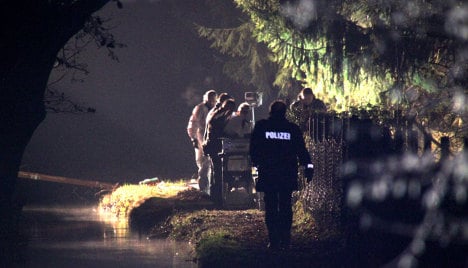The bodies of the 13-year-old boy and 14-year-old girl, named by daily Bild as Tobias L. and Nina B., were found in a secluded copse of trees next to a mill stream on the edge of a cemetery in the village of Bodenfelde.
Tobias L.’s body was reportedly found by his own mother.
The Northeim district police immediately established a murder investigation. A state prosecutor was due to hold a press conference at 2 pm on Monday afternoon.
Click here for a gallery of the investigation in Bodenfelde.
A police spokesman said on Sunday that the teenagers appeared to be the victims of a serious crime, though he did not elaborate. Evidence had been secured around the crime scene, which lies in Northeim district of Lower Saxony, close to the borders of Hesse and North Rhine-Westphalia.
Andreas Buick, a spokesman for the Göttingen state prosecutor, told Bild: “We are assuming that both teenagers were killed.”
The daily Hessisch-Niedersächsische Allgemeine reported that Tobias B.’s body was found by his own mother, who had been searching for him since he failed to come home on Saturday night.
The paper also reported that Nine B. had been missing since last Monday and that police had already been investigating at the Heinrich Roth school that both teenagers attended.
Overnight, police continued a search of the immediate area using floodlights.
About 70 people including classmates of the teenagers, gathered on Sunday night for a remembrance service near the place where the bodies were found.
DAPD/The Local/dw



 Please whitelist us to continue reading.
Please whitelist us to continue reading.
Member comments